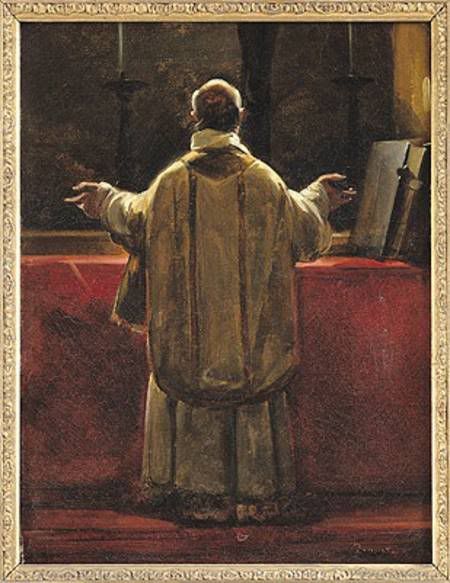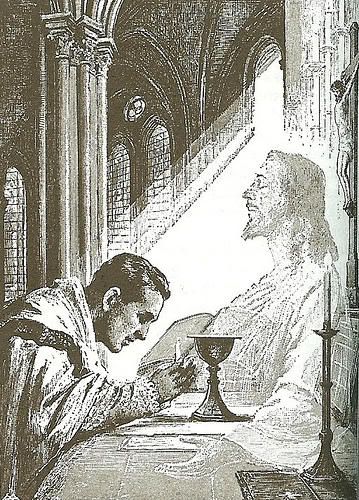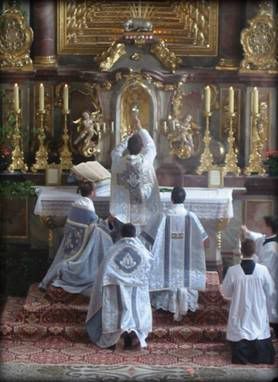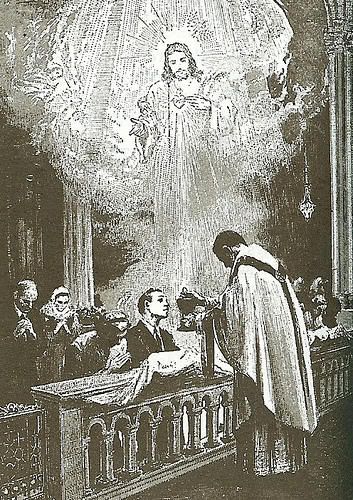Sunday, March 30, 2008
Taking Flight!
I will be flying off later this day. Please offer a prayer for me. I have decided not reveal where I'm heading to *yet*. Here's a picture to get those brain juices flowing. It's your guess! (Hint: The river runs through the city)
Will be back in approx. 8-16 days time. Expect some great shots!
God bless.
Labels: Announcements, Personal
Letter to Bishops
My dear Brother Bishops,
With great trust and hope, I am consigning to you as Pastors the text of a new Apostolic Letter "Motu Proprio data" on the use of the Roman liturgy prior to the reform of 1970. The document is the fruit of much reflection, numerous consultations and prayer.
News reports and judgments made without sufficient information have created no little confusion. There have been very divergent reactions ranging from joyful acceptance to harsh opposition, about a plan whose contents were in reality unknown.
This document was most directly opposed on account of two fears, which I would like to address somewhat more closely in this letter.
In the first place, there is the fear that the document detracts from the authority of the Second Vatican Council, one of whose essential decisions – the liturgical reform – is being called into question. This fear is unfounded. In this regard, it must first be said that the Missal published by Paul VI and then republished in two subsequent editions by John Paul II, obviously is and continues to be the normal Form – the Forma ordinaria – of the Eucharistic Liturgy. The last version of the Missale Romanum prior to the Council, which was published with the authority of Pope John XXIII in 1962 and used during the Council, will now be able to be used as a Forma extraordinaria of the liturgical celebration. It is not appropriate to speak of these two versions of the Roman Missal as if they were "two Rites". Rather, it is a matter of a twofold use of one and the same rite.
As for the use of the 1962 Missal as a Forma extraordinaria of the liturgy of the Mass, I would like to draw attention to the fact that this Missal was never juridically abrogated and, consequently, in principle, was always permitted. At the time of the introduction of the new Missal, it did not seem necessary to issue specific norms for the possible use of the earlier Missal. Probably it was thought that it would be a matter of a few individual cases which would be resolved, case by case, on the local level. Afterwards, however, it soon became apparent that a good number of people remained strongly attached to this usage of the Roman Rite, which had been familiar to them from childhood. This was especially the case in countries where the liturgical movement had provided many people with a notable liturgical formation and a deep, personal familiarity with the earlier Form of the liturgical celebration. We all know that, in the movement led by Archbishop Lefebvre, fidelity to the old Missal became an external mark of identity; the reasons for the break which arose over this, however, were at a deeper level. Many people who clearly accepted the binding character of the Second Vatican Council, and were faithful to the Pope and the Bishops, nonetheless also desired to recover the form of the sacred liturgy that was dear to them. This occurred above all because in many places celebrations were not faithful to the prescriptions of the new Missal, but the latter actually was understood as authorizing or even requiring creativity, which frequently led to deformations of the liturgy which were hard to bear. I am speaking from experience, since I too lived through that period with all its hopes and its confusion. And I have seen how arbitrary deformations of the liturgy caused deep pain to individuals totally rooted in the faith of the Church.
Pope John Paul II thus felt obliged to provide, in his Motu Proprio Ecclesia Dei (2 July 1988), guidelines for the use of the 1962 Missal; that document, however, did not contain detailed prescriptions but appealed in a general way to the generous response of Bishops towards the "legitimate aspirations" of those members of the faithful who requested this usage of the Roman Rite. At the time, the Pope primarily wanted to assist the Society of Saint Pius X to recover full unity with the Successor of Peter, and sought to heal a wound experienced ever more painfully. Unfortunately this reconciliation has not yet come about. Nonetheless, a number of communities have gratefully made use of the possibilities provided by the Motu Proprio. On the other hand, difficulties remain concerning the use of the 1962 Missal outside of these groups, because of the lack of precise juridical norms, particularly because Bishops, in such cases, frequently feared that the authority of the Council would be called into question. Immediately after the Second Vatican Council it was presumed that requests for the use of the 1962 Missal would be limited to the older generation which had grown up with it, but in the meantime it has clearly been demonstrated that young persons too have discovered this liturgical form, felt its attraction and found in it a form of encounter with the Mystery of the Most Holy Eucharist, particularly suited to them. Thus the need has arisen for a clearer juridical regulation which had not been foreseen at the time of the 1988 Motu Proprio. The present Norms are also meant to free Bishops from constantly having to evaluate anew how they are to respond to various situations.
In the second place, the fear was expressed in discussions about the awaited Motu Proprio, that the possibility of a wider use of the 1962 Missal would lead to disarray or even divisions within parish communities. This fear also strikes me as quite unfounded. The use of the old Missal presupposes a certain degree of liturgical formation and some knowledge of the Latin language; neither of these is found very often. Already from these concrete presuppositions, it is clearly seen that the new Missal will certainly remain the ordinary Form of the Roman Rite, not only on account of the juridical norms, but also because of the actual situation of the communities of the faithful.
It is true that there have been exaggerations and at times social aspects unduly linked to the attitude of the faithful attached to the ancient Latin liturgical tradition. Your charity and pastoral prudence will be an incentive and guide for improving these. For that matter, the two Forms of the usage of the Roman Rite can be mutually enriching: new Saints and some of the new Prefaces can and should be inserted in the old Missal. The "Ecclesia Dei" Commission, in contact with various bodies devoted to the usus antiquior, will study the practical possibilities in this regard. The celebration of the Mass according to the Missal of Paul VI will be able to demonstrate, more powerfully than has been the case hitherto, the sacrality which attracts many people to the former usage. The most sure guarantee that the Missal of Paul VI can unite parish communities and be loved by them consists in its being celebrated with great reverence in harmony with the liturgical directives. This will bring out the spiritual richness and the theological depth of this Missal.
I now come to the positive reason which motivated my decision to issue this Motu Proprio updating that of 1988. It is a matter of coming to an interior reconciliation in the heart of the Church. Looking back over the past, to the divisions which in the course of the centuries have rent the Body of Christ, one continually has the impression that, at critical moments when divisions were coming about, not enough was done by the Church’s leaders to maintain or regain reconciliation and unity. One has the impression that omissions on the part of the Church have had their share of blame for the fact that these divisions were able to harden. This glance at the past imposes an obligation on us today: to make every effort to unable for all those who truly desire unity to remain in that unity or to attain it anew. I think of a sentence in the Second Letter to the Corinthians, where Paul writes: "Our mouth is open to you, Corinthians; our heart is wide. You are not restricted by us, but you are restricted in your own affections. In return … widen your hearts also!" (2 Cor 6:11-13). Paul was certainly speaking in another context, but his exhortation can and must touch us too, precisely on this subject. Let us generously open our hearts and make room for everything that the faith itself allows.
There is no contradiction between the two editions of the Roman Missal. In the history of the liturgy there is growth and progress, but no rupture. What earlier generations held as sacred, remains sacred and great for us too, and it cannot be all of a sudden entirely forbidden or even considered harmful. It behooves all of us to preserve the riches which have developed in the Church’s faith and prayer, and to give them their proper place. Needless to say, in order to experience full communion, the priests of the communities adhering to the former usage cannot, as a matter of principle, exclude celebrating according to the new books. The total exclusion of the new rite would not in fact be consistent with the recognition of its value and holiness.
In conclusion, dear Brothers, I very much wish to stress that these new norms do not in any way lessen your own authority and responsibility, either for the liturgy or for the pastoral care of your faithful. Each Bishop, in fact, is the moderator of the liturgy in his own Diocese (cf. Sacrosanctum Concilium, 22: "Sacrae Liturgiae moderatio ab Ecclesiae auctoritate unice pendet quae quidem est apud Apostolicam Sedem et, ad normam iuris, apud Episcopum").
Nothing is taken away, then, from the authority of the Bishop, whose role remains that of being watchful that all is done in peace and serenity. Should some problem arise which the parish priest cannot resolve, the local Ordinary will always be able to intervene, in full harmony, however, with all that has been laid down by the new norms of the Motu Proprio.
Furthermore, I invite you, dear Brothers, to send to the Holy See an account of your experiences, three years after this Motu Proprio has taken effect. If truly serious difficulties come to light, ways to remedy them can be sought.
Dear Brothers, with gratitude and trust, I entrust to your hearts as Pastors these pages and the norms of the Motu Proprio. Let us always be mindful of the words of the Apostle Paul addressed to the presbyters of Ephesus: "Take heed to yourselves and to all the flock, in which the Holy Spirit has made you overseers, to care for the Church of God which he obtained with the blood of his own Son" (Acts 20:28).
I entrust these norms to the powerful intercession of Mary, Mother of the Church, and I cordially impart my Apostolic Blessing to you, dear Brothers, to the parish priests of your dioceses, and to all the priests, your co-workers, as well as to all your faithful.
Given at Saint Peter’s, 7 July 2007
BENEDICTUS PP. XVI
Labels: Liturgy, Second Vatican Council, Summorum Pontificum, Traditionalism
Saturday, March 29, 2008
Since we are...
... still in the Easter Octave, here is the Easter hymn of the Roman rite, Victimae Pascali Laudes.
To the Paschal victim let Christians
Offer up their songs of praise.
The Lamb has redeemed the sheep:
Christ who is without sin
Has reconciled sinners to the Father.
Death and life have fought a huge battle,
The Prince of Life was dead, but lives and reigns.
Tell us, Mary, what did you see on your way?
'The tomb of Christ, who is alive,
And I saw the glory of his rising;
Angels standing as witnesses, the shroud and linen cloth.
Christ my hope has risen:
He has gone to Galilee before you.'
Truly, we know Christ has risen from the dead:
O King and victor, have mercy on us. Amen. Alleluia.
It is indeed a shame that we no longer have the same love for the patrimony of our beautiful Church.
Labels: Easter, Music, Traditionalism, Video
"As Bishop I Cannot Be Silent"
The auxiliary bishop of Karaganda in Kazakhstan has spoken with Gloria.TV about his new book "Dominus est" in which he sharply criticises the practice of communion in the hand.
Labels: Bishops, Catholic Belief, Communion, Litugical Abuse, Traditionalism, Video
Ad Orientem
Are traditional priests really facing "the wall"?
Close your worldly senses and open your eyes of Faith!Consider this: When a general leads his troops into battle does he face them? When a representative of the people approaches the Ruler on their behalf does he face them? When a priest is going to the Lord on behalf of his people should he face them?
When the priest is acting as the intermediary between the people and God he faces the Altar. When he is dispensing the gifts of God, or speaking to the people, he faces the people.
A true account:-
Nun: "Father why are you celebrating Mass with your back to us?"
Priest: "Would you rather me show my back to the King of Kings and the Lord of Lords"
Need I say more? Even the Holy Father is facing the East. Look...

13 January 2007, Baptism of the Lord at the Sistine Chapel
Facing East in important because "...The priest is above all a servant of others, and he must continually work at being a sign pointing to Christ, a docile instrument in the Lord's hands. This is seen particularly in his humility in leading the liturgical assembly, in obedience to the rite, uniting himself to it in mind and heart, and avoiding anything that might give the impression of an inordinate emphasis on his own personality. I encourage the clergy always to see their Eucharistic ministry as a humble service offered to Christ and his Church. The priesthood, as Saint Augustine said, is amoris officium, it is the office of the good shepherd, who offers his life for his sheep." Sacramentum Caritatis #23.
Labels: Photos, Traditionalism
Low Mass Photos
 Here are the- long overdued- photos of the first Low Mass that was offered on the side altar of our Lady of Lourdes in the 4th quarter of last year at St. Joseph's Church. The celebrant was Rev. Fr. John Mary Chin, OCD. Enjoy!
Here are the- long overdued- photos of the first Low Mass that was offered on the side altar of our Lady of Lourdes in the 4th quarter of last year at St. Joseph's Church. The celebrant was Rev. Fr. John Mary Chin, OCD. Enjoy! The insertion of the Sacred Relics of Ss. Felicity and Perpetua.
The insertion of the Sacred Relics of Ss. Felicity and Perpetua. The Altar as it ought to be- clothed in 3 piece of fine linen.
The Altar as it ought to be- clothed in 3 piece of fine linen. View of the Altar from the Gospel Side
View of the Altar from the Gospel Side The Offering of the Host
The Offering of the Host The Offering of the Chalice
The Offering of the Chalice For This IS My Body- The Elevation
For This IS My Body- The Elevation Benedicat Vos- The Final Blessing
Benedicat Vos- The Final BlessingLabels: Liturgy, Photos, Traditionalism
Tenebrae 2008
 I was blessed to attend the first Tenebrae Service in 40 years. The offices of Matins and Lauds were beautifully chanted by the talented members of the St. Gregory the Great Schola.
I was blessed to attend the first Tenebrae Service in 40 years. The offices of Matins and Lauds were beautifully chanted by the talented members of the St. Gregory the Great Schola.For those who do not know what the Tenebrae is, here's some information I extracrted from Extraordinary From Singapore's blog: The Tenebrae is "the office which the clergy and the faithful say on Wednesday, Thursday, and Friday of this week, accompanied by the lamentations of the Prophet Jeremias, and other ceremonies. The word Tenebrae means darkness, and represents the prayers formerly said in the dark hours of the morning. In the Tenebrae the Church mourns the passion and death of, Jesus, and urges her children to return to God; she therefore makes use of those mournful words of Jeremias: 'Jerusalem! Jerusalem, be converted to the Lord, thy God!' " More information here.
Below are some of the photos I took with my new 7.2 megapixels Sony Cybershot DSC-H5. Enjoy!
 The Chapel 5 minutes before the Service.
The Chapel 5 minutes before the Service. The Entrance Procession.
The Entrance Procession. The 15 candles; as you can see first has already been extinguished.
The 15 candles; as you can see first has already been extinguished. The chanting of the lamentations of Jeremias.
The chanting of the lamentations of Jeremias. The female faithful veiled.
The female faithful veiled. The female faithful veiled.
The female faithful veiled.Labels: Divine Office/Liturgy of the Hours, Liturgy, Photos, Tenebrae, Traditionalism
Happenings (23/3 to 29/3)
- Assisted Mass celebrated by my Spiritual Director in my new laced Folrentine Surplice
- Collected a fascia from Sr. Theresa Lee, FMM
- Attened a Neo-Catechumenical Mass celebrated by Rev. Fr. Timothy Yeo (6hr long!)
- Constructed an Altar step for the Home Altar (photo coming soon)
- Bought a new book, "The Introduction to the Devout Life" by St. Francis de Sales
- Went on a search for Altar Candle sticks on behalf of Fr. Gerard Weerakoon
- Heard news that the Society of St. Pius X have procured a property along Thomson Road, opposite the Holy Spirit Parish
- Easter dinner and fellowship with Holy Family Bible Discussion Group at MacCafe in People's Parkway
- Procured a new LCD television and DVD player for my bedroom
- Confirming the choice of chants and hymns for the Feast of St. Mark the Evangelist
- Attended several Tridentine Masses after a long while
- Participated in my first Tenebrae, at St. Patrick's Chapel
* Yes, I'm still enjoying my 7 week semestral break
Labels: Happenings
The Spirit Of A Believing Welcome
This may be wise according to the world's standards, but it does not represent the fullness of true Christian charity. Real giving always entails vulnerability. Christian charity, as modeled by the early Church in the 1st reading is based on the promise that the goods of this world come as gifts to be used wisely for the benefit of all, especially the poor and needy among us. Few of us are ever going to voluntarily give everything away; when we do give, however, may we give with the generosity of Christ which knows no limits.
Our giving also should not only be one in cash or kind, but also one in faith. A giving of our faith, a proclamation of our belief, a declaration of the spiritual truth we hold near and dear is sometimes what someone needs, more that money or help in any other form. Our Gospel text shows us Thomas in just that light. From refusing to open up his heart to accept, one meeting with the risen Jesus and he proclamed the highest form of faith that can be declared: "My Lord and my God!"
His believing welcome, as it were, of Jesus' risen presence among His disciples opened Thomas up to new and greater possibilities. His encounter with Jesus began to prepare him for the mission the Lord had in store for him. Jesus was in fact, taking Thomas out of the "tomb of doubt" that had enslaved him for so long. The Resurrection encounter gave Thomas the boldness to declare his faith, a faith he would one day gladly suffer martyrdom for.
Yet, what has all this in store for us? What practical application can we draw from the 1st reading and the Gospel passages of this Sunday's Mass? Possibly it is calling us to sit down in the presence of the risen Jesus and see just how generous, welcoming and faithful our Lenten preparation has made us. Have we given willingly during Charities Week? have we sacrifice some comfort for the sake of our felow Catholics?
Has our Easter celebration been one big faith proclamation? We will only be able to give like the early Church and profess our faith like Thomas once we allow the ever powerful Ressurection presence of Jesus to encounter us, challenge us, transform us and invite us to live fully as a child of the Light and a child of the Resurrection. Amen.
Teach us O Lord, to give without counting the cost & let us always boldly proclaim our faith in You, as our only Lord and God. Amen.
Fraternity of Mater Dolorosa
Labels: Easter, Sacred Scripture, Spirituality, Sunday Reading Reflections (A)
Prayer for the Dignity of the Mass
We beseech You, our Almightly Lord and King, to defend the Holy Sacrifice of the Mass from all abuses and sacrileges. Arise Lord, and deliver us, we humbly pray, from these detestable and abominable acts of impiety that threaten the blessed memory of Your sorrowful passion, cruel death, and glorious resurrection.
Send forth Your Holy Spirit to illuminate the hearts of all Your priests. Give them a spirit of reverence, humility, patience and love. Enkindle in their hearts a more fervent love for the Eucharist. Lord, You are the True Light of the world, radiate Your Light now to dispel the traps and snares that the evil one has set before Your priests. We pray especially pray for Your priest(s), N., the shepherd(s) to whom You have entrusted the duty of the salvation of souls.
O Lord, grant all of us true faith. May we always celebrate the Eucharist in reverence, love, care, devotion, and orthodoxy. St. Peter Julian Eymard, St. Francis Fasini, St. Padre Pio, St. Josemaria Escravia, St. Benedict, and all ye other Eucharistic Saints, pray for us! Amen.
- the Author-
Labels: Eucharist, Litugical Abuse, Liturgy, Prayer
Tuesday, March 25, 2008
Thou Art Present!
In the Liturgy, we see that Christ is present as both priest and victim. He is present as priest in the person of the celebrant and victim, in the Eucharistic species. This has been affirmed by the council of Trent; "For, it is one and the same Victim, the same one now offering by the ministry of the priests as He who then offered Himself on the Cross, the manner of offering alone being different" (Denzinger-Schonmetzer 1743).
Over the course of the last 30 odd years, we have been seeing a decline in the believe in the Real Presence of Jesus in the Eucharist. What has contributed to this? Here are some of my findings/ideas:
- Christ's Sacramental Presence devalued; put on par with Christ's presence in the Scriptures.
- The idea that the common priesthood is more important becasue it makes Christ spiritually present.
- Genuflections which show adoration to Christ has been reduced significently; down to 3 from the original 14.
- Revised Offertory; "the bread of life", "spiritual drink".
- The Eucharist often being refered to in relation to the congregation and not in itself.
- The current GIRM makes no mention of the Real Presence. The word "bread" is used almost throughout the GIRM.
- The Celebrant is encouraged to receive the Body of Christ reverently without making a genuflection.
- The purification of fingers have been suppressed.
- The keeping of the thumb and finger joined as a sign of respect for the Sacred Particles from the consecration has been suppressed.
- Over usage of laity in the distribution of communion.
- Communion standing and on hand.
- The turning of the House of God into a entertainment center where audio-visual projectors screen advertisments, video clips, etc...
- The use of wine glasses in place of chaices and stainless steel bowls in place of gold-plated metal ware.
Labels: Communion, Eucharist, GIRM, Traditionalism
Subscribe to Posts [Atom]














